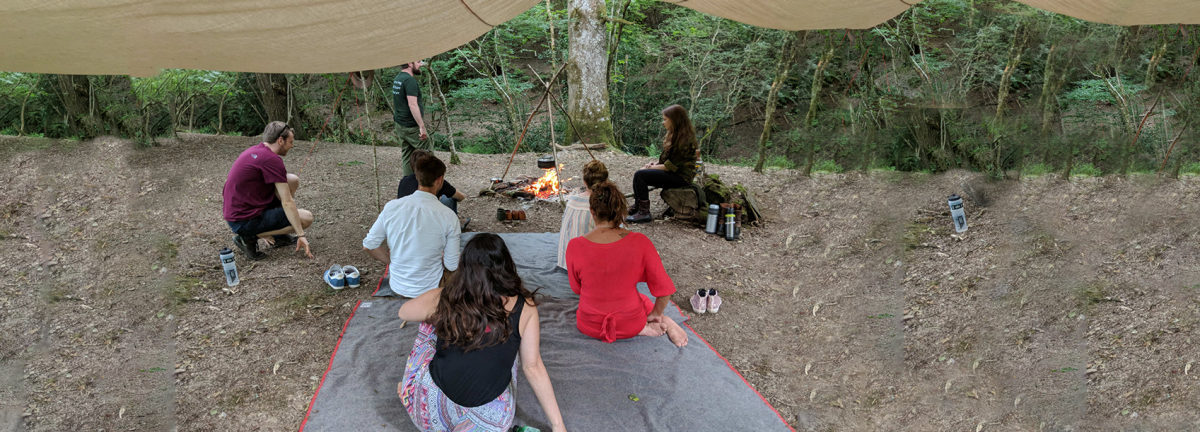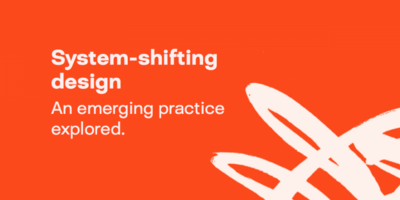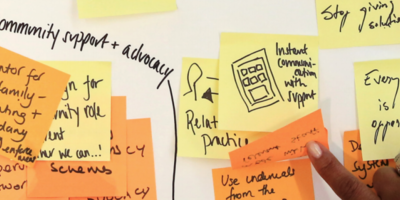Transform Ageing: Wellbeing in the woods – inside Aquafolium

At the end of 2017 we invited social entrepreneurs to respond to a series of six briefs compiled by local communities looking for innovative product and service solutions, with the simple aim of improving the experience of later life for local people in Somerset, Torbay, Devon and Cornwall. 19 social entrepreneurs successfully responded and received funding and support to deliver lasting social impact in the region.
In the next of our series we find out from another successful applicant, Aquafolium, a social enterprise on a mission to rewire society with nature.
At the start of a forest bathing experience with Aquafolium, a social enterprise that reconnects people with nature in Devon, participants are asked to pick up a stone from the forest floor and to project all of their worries onto it.
At the end of the experience, they are asked whether they want to pick up the stone again or to leave their worries in the forest.
"I found that really effective,” says Mary Nisbett, chief executive of a health and care agency called West Bank. “It makes you think about how much of those things you needed to be worrying about. The outdoors gives you a sense of proportion.
Nisbett had never heard of forest bathing before it was proposed to her by Aquafolium. At first she had to be persuaded that it didn’t involve taking her clothes off in the forest.
“You say it to a lot of people and they say, ‘I’m not going into a forest in my swimming costume!’ says Camilla de Bernhardt Lane, who founded Aquafolium with her husband Mark in August 2017. “What we are talking about is mindfulness.”
The practice comes from the Japanese shinrin, for tree, and yoku, for bathing, or soaking up the forest’s atmosphere. Aquafolium has been supported with £3000 from the Transform Ageing programme to buy equipment, including a shelter and tea-making accessories for the ceremony at the end of every session. The money has also helped with insurance needed to take vulnerable people to the forest.
De Bernhardt Lane formed Aquafolium to facilitate people going out into nature or to take nature to those who cannot or do not want to go into the outdoors. She had long been interested in the restorative power of nature. Tree bathing has blossomed in the UK. Center Parcs has incorporated elements into a new spa, while the Forestry Commission plans to launch a nationwide forest-bathing programme.
But evidence for the benefits of the practice is scant. De Bernhardt Lane contacted West Bank, which provides services for adult and young carers in Devon, to see if they would be interested in a pilot to gather some evidence. After trying a session with her team, Nisbett agreed to offer forest bathing to carers, to release them temporarily from the pressures and stresses of their lives.
“I live locally and I’ve walked in those forest, but I don’t think I’d ever experiences the forest in that way, to see and listen and taste, all of the sense,” Nisbett said. “It’s very restorative.”
During a two-hour session, De Bernhardt Lane guides participants through a slow one or two mile walk through the forest, asking them to be mindful of the colours and smells. “If you are walking a dog there might be a green blur, so it’s about slowing down and noticing that this bit of green smells like watermelon, or pineapple,” she says. “Then we make a tea out of the leaves so you can taste it, and we touch the bark and practice slowing down.”
Aquafolium is working with the Woodland Trust to do sessions for elderly people and dementia patients in memory cafes. De Bernhardt Lane says: “We’re going to cafes in Devon and running sessions to bring woodland to them through photographs, birdsong, plant materials, and doing activities they might do outside with a view to getting some of the people that attend the memory cafe to join us in the forest.”
The company also runs foraging courses and a forest bathing leadership course, teaching people to lead some of the activities that they run. “It’s about who we break down the barriers between how we enjoy doing activities outside,” she says.
Early results from the pilot session with carers are promising. Aquafolium monitors the blood pressure of participants and asks them how they feel at the start and end of sessions. “In happiness and relaxation, people are neutral when they start but by the end they are so happy, they say they feel really relaxed,” she says.
“Generally people also see a drop in blood pressure. The other thing we measure is around concentration. I never thought of this but if you are really relaxed they see a benefit in concentration.”
The venture is one of many innovations supported by Transform Ageing. The programme is funded by Big Lottery Fund and run in partnership between Design Council, UnLtd, the South West Academic Health Science Network and the Centre for Ageing Better. It aims to revolutionise the approach to health, wellbeing and social care for people in later life.
At the day centre run by West Bank, people who are very frail are invited to experience the forest through the task and smell of pine cones and leaves brought back from the forest.
During the sessions for carers, West Bank provides respite care for the cared-for person and helps with transport, freeing the carer to participate in sessions. “There is a benefit to the carers doing things as a group activity. We like to introduce carers to each other in the hope that they build relationships” she says. “Carers understand what one-another is experiencing and get to immerse themselves in an experience that releases them from the day-to-day.”
Transform Ageing is a pioneering programme taking a community and design led approach to improve people’s experience of ageing. It brings together people in later life, their friends, family and carers, social entrepreneurs and public sector leaders to define, develop and deliver new solutions that better support the needs and aspirations of our ageing communities.
Subscribe to our newsletter
Want to keep up with the latest from the Design Council?



